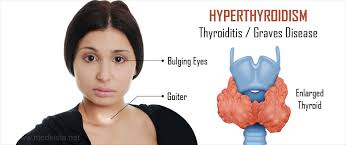
What is the thyroid gland?
The thyroid gland is a small butterfly-shaped gland located at the base of your neck, just below Adam’s apple. The thyroid gland wraps around your trachea (windpipe). Two parts of the thyroid gland are connected in the middle by a thin layer of tissue known as the isthmus. It is part of a complex glandular network called the endocrine system. The endocrine system is responsible for coordinating many of your body’s activities. The thyroid gland produces hormones that regulate your body’s metabolism.
The thyroid gland produces hormones that carry blood to every tissue in the body. This helps regulate metabolism, the process by which the body converts food into energy. It also plays a role in maintaining the functioning of organs and helping the body retain heat.
Excessive hormone production is known as Hyperthyroidism and inadequate hormone production known as Hypothyroidism. Four common thyroid abnormalities are Hashimoto’s disease, Graves’ disease, goitre, and thyroid nodules. Sometimes the thyroid produces too much hormone. It can also develop structural problems such as swelling and growth of cysts or nodules. Thyroid surgery may be needed if you experience this problem.
During thyroid surgery, all or part of the thyroid is removed. A doctor will do this surgery in the hospital when the patient is under general anaesthesia. This article is intended to give information about when doctors suggest surgery for the thyroid gland. Before that, let us see!
What is a thyroid disorder?

The thyroid gland uses iodine (mostly digested from food) to produce hormones that control how your body uses energy. Almost every organ in the body is affected by thyroid function.
The pituitary gland and hypothalamus, which are present at the base of the brain, control the production and release of hormones by the thyroid gland. The primary function of the thyroid is secreting a hormone called thyroxine, or T4, which is converted into a hormone called T3. Both hormones circulate in the bloodstream and regulate metabolism. The amount of T4 produced by the thyroid is determined by a hormone produced by the pituitary gland and is called TSH or thyroid-stimulating hormone. Depending on the T4 level in the body, the pituitary gland produces more or less TSH to cause the thyroid to produce the right amount of T4.
Thyroid disease occurs when the thyroid gland is not functioning correctly, either by releasing too much T4 hormone or when not releasing enough. There are three main thyroid disorders:
- Hypothyroidism (underactive thyroid)
- Hyperthyroidism (overactive thyroid)
- Thyroid cancer.
Hypothyroidism (underactive thyroid):

It occurs when the thyroid gland does not produce enough T4 hormone. Inactive thyroid can occur because the pituitary, hypothalamus, or thyroid itself does not function as it should. Nearly five per cent of the population has an inactive thyroid; more women suffer from this disease as compared to men. Symptoms of an inactive thyroid include:
- High cholesterol
- Depression
- Fatigue
- Hair loss
- Memory loss
- Dehydrated skin
- Feeling cold
- Constipation.
Hyperthyroidism (overactive thyroid):

Hyperthyroidism occurs when the thyroid gland produces more thyroid hormones than the body needs. An overactive thyroid can occur if hypothalamus, pituitary, or thyroid itself is not functioning correctly. An overactive thyroid is not very common. This affects more than one per cent of the Indian population. As with the inactive thyroid gland, more women than men suffer from this disease. Symptoms of an overactive thyroid include:
- Restlessness
- Agitation
- Tremors
- Weight loss
- Rapid heart rate
- Sweating
- Intolerance to heat
- Irregular menstrual flow
- Thinning skin
- Sleep changes
- Frequent bowel movements
- Goitre, enlargement of the thyroid gland that resembles a large mass that protrudes from the throat and is caused by excessive hormone production in the gland.
Arrhythmia (irregular heart rhythm), heart failure and mental confusion (delirium) can occur in older people. If left untreated, patients can suffer from “thyroid storms”, where high blood pressure, heart failure, and fever can cause critical situations that desperately need medical attention.
Thyroid cancer:

Thyroid cancer occurs when cells in the thyroid gland change and multiply, and cancer cells form nodules or growth. If left untreated, this cancerous nodule can spread to lymph nodes, surrounding tissue and bloodstream. Thyroid cancer is rare. However, the pace has increased in the last 30 years. Experts believe that this increase is mainly due to better detection through the use of ultrasound technology. Most thyroid cancers can be cured. There are four types of thyroid cancer.
- Papillary thyroid cancer
- Follicular thyroid cancer
- Medullary thyroid cancer
- Anaplastic thyroid cancer
There are many causes of thyroid disease. Disorders that affect thyroid function are:
- Thyroiditis (inflamed thyroid
- Hashimoto’s disease or chronic lymphocytic thyroiditis (inflamed thyroid):
- Pituitary or hypothalamic disease:
- Radiation treatment
- Graves’ Disease
- Hyperfunctioning thyroid nodules
How is thyroid disease diagnosed and evaluated?

Symptoms include fatigue, inability to accept, changes in skin or hair, lumps in the neck, hoarseness, or pain in the thyroid gland. Due to these symptoms, your doctor will likely do a physical examination to determine whether your thyroid is enlarged and orders a blood test to measure your thyroid hormone levels. If a blood test shows signs of abnormal thyroid activity or cancer, additional tests may be needed, such as:
- Thyroid Scan and Uptake:
- Ultrasound biopsy with fine-needle aspiration
- Imaging tests (CT scan, PET / CT scan, whole-body iodine scan)
Indication for thyroid surgery:

The most common cause of thyroid surgery is the presence of a nodule or tumour on the thyroid. Most nodules are benign, but some can be cancerous or precancerous.
Even benign nodules cause problems if they are large enough to obstruct the throat, or if they stimulate the thyroid to produce excessive hormones.
Surgery can improve Hyperthyroidism. Hyperthyroidism is often the result of an autoimmune disorder called Graves’ disease. Graves’ disease causes the body to misidentify the thyroid as a foreign body and send antibodies to attack it. These antibodies trigger the thyroid gland and cause excessive hormone production.
Another cause of thyroid surgery is swelling or enlargement of the thyroid. This is known as goitre. Like large nodules, goitre can clog the throat and interfere with eating, talking and breathing.
Your doctor may recommend considering thyroid surgery for four main reasons:
- You have a nodule that can become thyroid cancer.
- You are diagnosed with thyroid cancer.
- You have a nodule or goitre that causes local symptoms – tracheal compression, difficulty swallowing, or a visible or unhappy mass.
- You have a lump or goitre that causes symptoms related to excessive thyroid hormone production and secretion – or a toxic lump, toxic multinodular goitre, or Graves’ disease.
- If non-surgical treatment does not work
Thyroid cancer: Most thyroid cancers are operated on to remove the thyroid. Radioactive iodine therapy is often used after surgery to destroy the remaining thyroid tissue. This includes the rest of healthy tissue and all other cancer cells. Depending on the stage of cancer, lymph nodes in the neck can also be removed for examination. In some cases, when the cancer is tiny, only a portion of the gland can be removed. The partial removal of the gland is called thyroid lobectomy. After surgery, most patients need to take synthetic thyroid hormone every day for the rest of their lives. You and your doctor will discuss the best surgical options for you, depending on the type of cancer you have and whether it has spread or not. For more information, meet me at Sunshine Hospital.
Types of surgeries:

The extent of thyroid surgery should be discussed with you and your thyroid surgeon and can generally be classified as partial thyroid removal or full thyroid removal. The partial removal of the thyroid gland can be classified as follows:
- Open thyroid biopsy: An operation that is rarely used where the lump is cut directly;
- Hemi thyroidectomy or thyroid gland lobectomy: where the lobe (one half) of the thyroid gland is removed;
- Isthmusectomy: Removal of only the thyroid tissue bridge between two lobes; used mainly for small tumours located in the isthmus.
- Finally, the removal of total or nearly total thyroid is the removal of all or a significant portion of thyroid tissue.
The cause of the operation determines recommendations regarding the level of thyroid surgery. For example, a node that is confined to one side of the thyroid gland can be treated with hemithyroidectomy. If you are being examined for large bilateral goitre or large thyroid cancer, you will probably have a recommendation for complete thyroid removal. However, the extent of the operation is a complex and personal medical decision and must be made in collaboration with your endocrinologist and surgeon.
Surgery (removal of the thyroid):

In patients who cannot take antithyroid drugs or radioactive iodine, surgical removal of the thyroid, called the removal of the thyroid, is possible. The surgeon makes an incision at the base of the neck and removes most of the thyroid. With minimally invasive video-assisted thyroidectomy, smaller incisions are made, and a video camera supports the surgeon. Most operations last between 2 and 2½ hours. Patients returned home the same day or the day after follow-up. While complications from thyroid surgery are rare, there are always risks associated with surgery. An experienced surgeon can help prevent complications such as damage to the parathyroid gland (which causes low calcium levels) or vocal cords (which cause hoarseness invoice). After removing the thyroid gland, patients must replace their thyroid hormone with synthetic hormone (Synthroid®) at any time. If the parathyroid gland is also removed, the patient also needs a calcium supplement.
Conclusion:
Thyroid testing is the only way to determine positively whether your thyroid is functioning correctly or not. Dr Venugopal Pareek and his team are your best source for thyroid assessment and treatment. Our team has extensive experience and will determine the best type of treatment for each patient. If you have noticed a combination of the above symptoms and suspect that your thyroid might not be functioning correctly, make an appointment with us today! We ensure that your thyroid works optimally. Call us at +91 91-777-77715 and book your appointment now!







